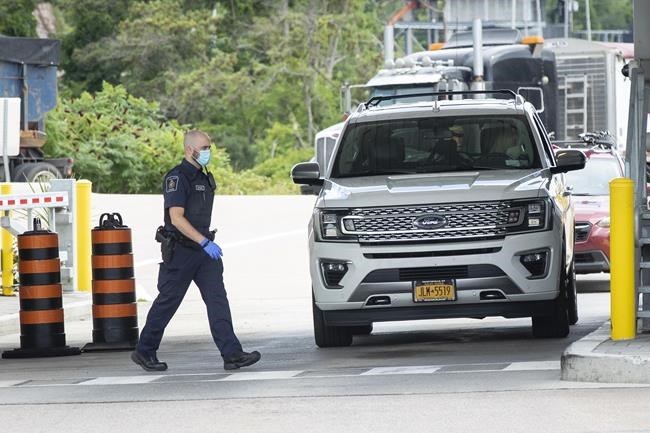WASHINGTON ‚Äî The United States is actively exploring how to welcome back international visitors, including whether they will need to be fully vaccinated against COVID-19, as stakeholders keen to reopen the Canada-U.S. border set their sights squarely on Capitol Hill.¬Ý
Interagency working groups, tasked with finding the best way to ease the global travel restrictions imposed by the Trump administration, are considering whether to impose a vaccine requirement on incoming travellers, White House officials said Thursday.
"That is certainly under strong consideration," said press secretary Jen Psaki, who cited the highly transmissible Delta variant as a key factor in the White House's go-slow approach.¬Ý
"Given where we are today with the Delta variant, we will plan to maintain existing travel restrictions at this point. However, what our interagency working groups are focused on … is working to develop a plan for a consistent and safe international travel policy."
Two key questions, however, went unanswered: when the restrictions might begin to ease, and whether the ongoing discussions encompass the unique hybrid patchwork of rules that currently govern visitors from Canada.¬Ý
In White House parlance, "international travel" largely refers to the limits on intercontinental visitors from a number of foreign countries, including China, India, Ireland, Iran, –°¿∂ ”∆µ Africa, Brazil and the 26 European countries without border controls, known as the Schengen group.¬Ý
While so-called "discretionary" or non-essential travel from Canada has been banned at land border crossings since March 2020, most air, rail and sea travellers have been exempt from those limits for the duration of the pandemic.¬Ý
The land border rules will get even more wrinkly Monday when Canada begins allowing fully vaccinated U.S. citizens and permanent residents back into the country. The United Kingdom has also been easing its restrictions on vaccinated Americans. In neither case has the U.S. reciprocated.¬Ý
That's despite the fact that nearly 70 per cent of eligible Canadians are fully vaccinated, and 81.7 per cent have received at least one dose of a two-shot vaccine.¬Ý
"We cannot fully live in fear because of a percentage of people who continue to hesitate" to get vaccinated, Prime Minister Justin Trudeau said in French during a news conference Thursday.¬Ý
"That is why we will continue to try and resume a normal life: we will start accepting fully vaccinated tourists first from the States and then from other countries."
Dr. Theresa Tam, Canada's chief public health officer, said the Delta variant likely poses a greater threat through domestic transmission than it does from U.S. visitors. Travel will be monitored closely to allow the government to act quickly if necessary.
"If we see any significant concerns, of course, we can adjust our border stance accordingly," Tam said. "For now, I think all the indicators are still pointing in the right direction for that next phase in terms of a border approach."
Stakeholders on both sides of the Canada-U.S. border, meanwhile, have largely exhausted their patience waiting to hear something similar from the Department of Homeland Security.¬Ý
A coalition of U.S. and Canadian business leaders, led by the North American Strategy for Competitiveness, wrote this week to senior congressional leaders urging them to demand that the department put forward a detailed reopening strategy.¬Ý
Specifically, the group is worried that when the time does finally come, U.S. Customs and Border Protection agents will struggle to process vaccination status reports and COVID-19 test results amid a crush of impatient inbound travellers.¬Ý
"We understand the necessity of protecting public health and believe that the U.S. can do so while also easing the restrictions at the land border," their letter reads.¬Ý
However, U.S. Customs and Border Protection "does not appear to have a plan in place to execute a safe reopening without causing tremendous delays at land ports of entry."¬Ý
The letter is addressed to the chairs and ranking members of the Senate and House committees and subcommittees on homeland security, as well as members of several key Canada-U.S. caucus groups.¬Ý
Its signatories include organizations focused on cross-border commerce and travel, including the Canada-U.S. Business Association, the Border Trade Alliance and the Pacific Northwest Economic Region.¬Ý
Neither Psaki nor Jeff Zients, the co-ordinator of the White House COVID-19 response, specifically mentioned Canada by name during their respective news conferences Thursday. But they did make clear that now is not the time to lift the restrictions wholesale.¬Ý
The working groups, which include officials from Canada, Mexico, the European Union and the U.K., are exploring a "phased approach" that may include a vaccination requirement, Zients said.
"There's still policy work –°¿∂ ”∆µ done here," he said. "That's not a decision at this point; that's one of the paths that's –°¿∂ ”∆µ looked at and considered. But there are alternative paths –°¿∂ ”∆µ looked at at the same time."¬Ý
It's also not clear whether the U.S. will require visitors to have received one of the only three vaccines to receive emergency-use approval by the Food and Drug Administration: Pfizer-BioNTech, Moderna or Johnson & Johnson.¬Ý
This report by The Canadian Press was first published Aug. 5, 2021.¬Ý
James McCarten, The Canadian Press




